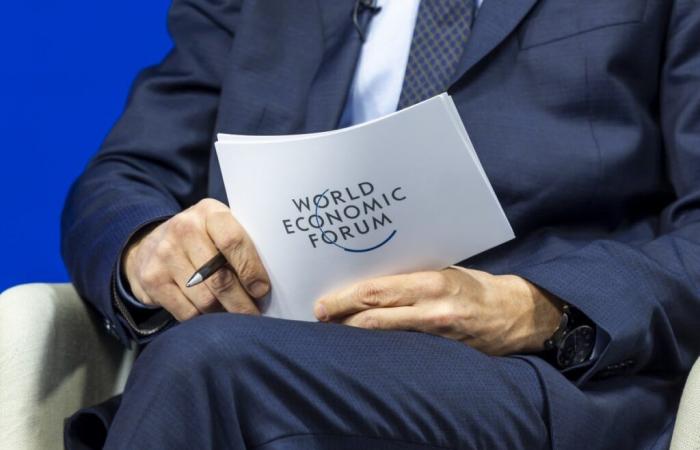View of Davos and the convention center at sunset before the 55th annual meeting of the World Economic Forum.
Keystone / Gian Ehrenzeller
The World Economic Forum (WEF) in Davos this year will seek to encourage countries to collaborate rather than follow the path of protectionism, with the promise of an artificial intelligence (AI) revolution that benefits everyone.
This content was published on
January 18, 2025 – 10:38
The 55e annual Davos summit will include many political heavyweights. In particular, speeches are expected from Ukrainian President Volodymyr Zelensky, European Commission President Ursula von der Leyen, Chinese Deputy Prime Minister Ding Xuexiang, Argentine President Javier Milei, South African President Cyril Ramaphosa and Prime Minister Spanish Minister Pedro Sánchez.
The programExternal link will give pride of place to the major geopolitical issues of the moment. The President of the European Parliament Roberta Metsola and the Polish Minister of Foreign Affairs will participate in a panel entitled “Ukraine: the way forward”. The Swedish Finance Minister will take part in another round table devoted to “Russia and its place in the world in 2025”.
A high-level discussion, bringing together the Saudi, Jordanian and Iraqi foreign ministers, will also focus on solutions to reduce tensions in the Middle East. Migration will be the subject of a panel exploring the “fault lines in Latin America”, in which the President of Peru Dina Boluarte and her Panamanian counterpart José Raúl Mulino will take part.
WEF founder Klaus Schwab will also hold his traditional “one-on-one” talks (but in public, of course) with the interim leader of Bangladesh, Mohammed Yunus, and Malaysian Prime Minister Anwar Ibrahim.
Laying the foundations for an intelligent and ecological revolution
Now that the suspense over the presence of re-elected American President Donald Trump has been lifted (he will not make the trip, but will participate online), the 55e edition of the WEF can once again focus on the eminently “non-Trumpian” theme that it has chosen for 2025: collaboration in the era of artificial intelligence.
Donald Trump has embraced a more protectionist vision for the United States, whether by threatening to raise tariffs on imports or returning to economic patriotism with his “America First” policy. “). The organizers of the WEF seem to be aiming for the opposite goal.
On its website, the World Economic Forum warns of a worsening of societal divides, associated with a trend towards protectionism, believing that this hampers trade and investment. The WEF hopes to convince the international elite that together helping the world transition to a digital and sustainable economy can be a cure for competition between global powers.
“The ability of economies to benefit from trade in digital and green technologies will be key to converging developing and developed economies’ trade revenues,” says the World Trade Organization’s latest trade outlook. (WTO), dated October 2024. The authors also emphasize that “multilateral cooperation remains essential to build an inclusive global trading system promoting the transformation towards a digital and sustainable global economy”.
The WEF wants to address ways in which the world can make this transition. By analyzing the program for its 2025 edition, swissinfo.ch has identified a few key areas representative of the concept of “collaboration in the age of artificial intelligence”.
According to the WEF, the global infrastructure gap is expected to reach $15 trillion (13.6 trillion Swiss francs) by 2040. Countries will need to decide which physical, digital and institutional investments to prioritize to best enable digital transformation and delivering public services at scale.
Infrastructure can span hardware, including artificial intelligence data centers and smart energy grids, but also digital identification and payment systems.
Governments and the private sector should collaborate to successfully implement a digital ecosystem that benefits all of society. Governments should therefore commit to opening government data and making it available in a central catalog, while companies should agree to comply with universal standards and develop responsible AI models.
The Estonian X-Road projectExternal link is a good example of this type of cooperation. This is a system for securing data exchanges between the private and public sectors. X-Road forms the backbone of “e-Estonia” and saves the Estonian population an estimated 1,345 years of working time every year.
The inclusive digital revolution will also involve cross-border data sharing. This will be necessary if we want to make the most of advances in, for example, medicine, autonomous vehicles or even finance.
So how can we encourage data sharing and maximize the benefits for everyone? GAIA-XExternal link is an example of an initiative in this sense.
-This is a cloud decentralized initiative involving several countries, industries and organizations in Europe, which aims to improve secure data sharing and the development of AI. It allows start-ups and public institutions across the continent to access important public data sets, in accordance with the General Data Protection Regulation (GDPR). Videos of surgical operations can, for example, be used to train AI to spot risks during operations.
Putting technology at the service of people and the planet
Cross-border collaboration can also bring the benefits of the digital revolution to the populations who need them most.
More than 4.5 billion people do not have access to essential health services. AI and data ecosystems could address these global disparities by optimizing accessibility and efficiency.
In cancer, for example, technologies such as AI, telemedicine and digital health platforms can improve diagnosis and access to treatment, as well as reduce drug costs.
Another area where technology can help: vaccine distribution. About one in ten people do not get routine vaccinations. Technology used in industrial supply chains could help determine the best transportation routes to optimize delivery times, as well as improve cold chain management to preserve vaccine effectiveness.
Global digital transformation could also be beneficial for the environment. Economic growth requires increased exploitation of resources, which is expected to increase by 60% by 2060, according to the WEF.
This is why the usefulness of technology and innovation for the circular economy, with a view to both profitable and efficient use of resources, is a central theme of the 2025 edition of the Davos summit. .
In terms of circularity, the bioeconomy sector is rapidly emerging and is expected to be worth $30,000 billion by 2030. This involves using renewable organic raw materials (agricultural crops, forest products, marine resources) for the production of food, materials and energy. Biofuels, bioplastics, chemicals and pharmaceuticals of biological origin, for example, come from the bioeconomy.
Overcoming protectionism and economic patriotism
As has been said, data sharing will be necessary if we want to be able to benefit from the cumulative benefits of digital technologies and services. Which is not easy for competing economies, which distrust each other.
“Many countries are more concerned about where their data is hosted and who has access to it. Some, seeing data as a crucial national asset, strive to regulate and control data flows outside their borders,” says Ning Wang, ethicist and political scientist at the Digital Society InitiativeExternal link from the University of Zurich.
Harmonizing laws and regulatory frameworks relating to data protection can be a challenge, notes the specialist – especially when it comes to sharing sensitive data, such as medical records or sensor data from autonomous vehicles.
Cross-border data sharing therefore raises fundamental ethical and governance questions, as data security and privacy standards and capabilities vary from country to country.
Developing international standards and agreements on data sharing, however, could provide a framework for countries to collaborate, while taking into account sovereignty concerns.
International institutions such as the United Nations and the World Trade Organization, as well as professional associations such as the Institute of Electrical and Electronics Engineers, could play a key role in defining these standards, believes Ning Wang.
“In this process, emphasizing the mutual benefits of data sharing can help overcome economic patriotism,” notes the ethicist. For example, pooling data from multiple countries can result in more comprehensive datasets for AI applications, benefiting all parties involved.”
Technological advances, such as encryption techniques that protect data while allowing cross-border sharing, can also help alleviate some concerns. Finally, governments can foster innovation through policies that encourage responsible data sharing while protecting national interests.
“This may involve, for example, encouraging companies to share non-sensitive data,” explains Ning Wang, “or creating data funds managed by international organizations in the general interest.”
Text proofread and verified by Balz Rigendinger/gw, translated from English by Pauline Turuban






